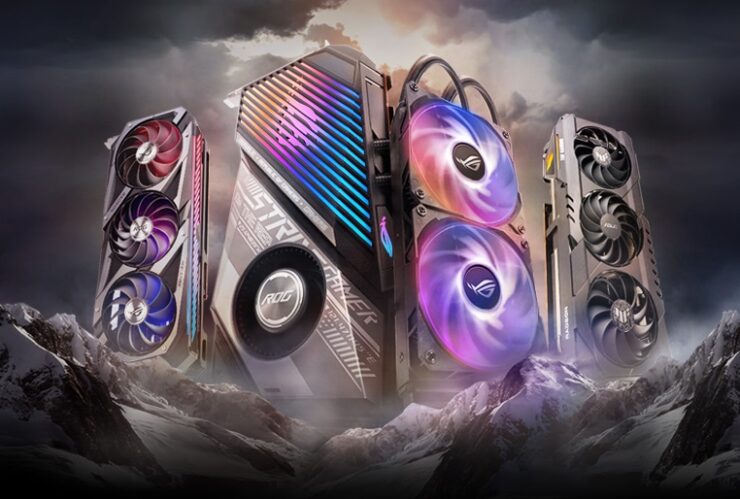
The AMD Radeon RX 6800 series graphics cards including the RX 6800 XT & RX 6800 are finally receiving their much-awaited custom variants today. Each major partner of AMD will be having their own lineups of custom cards based on the Big Navi GPU offering superior cooling & stylish designs unique to their branding.
AMD Radeon RX 6800 XT & RX 6800 Custom Models Roundup – Tri-Frozr, ROG STRIX, Red Devil, Nitro+, Taichi, Speedster, WindForce & Many More!
There are tons of AMD Radeon RX 6800 XT & RX 6800 custom designs to select from. Each AIB has at least two different variants of each graphics card featuring custom PCBs, factory overclocks, and much beefier cooling solutions than the reference models. These custom variants will also come at premium price points and we will make sure we can have prices listed by the time the NDA lifts on them.
As of right now (25/11/2020), all Radeon RX 6800 XT & RX 6800 custom models are sold out on major retailers and some have sighted that there wasn’t enough stock delivered to them by AIBs. We will keep you updated with the stock situation as we get more info from retailers, AIBs & AMD.
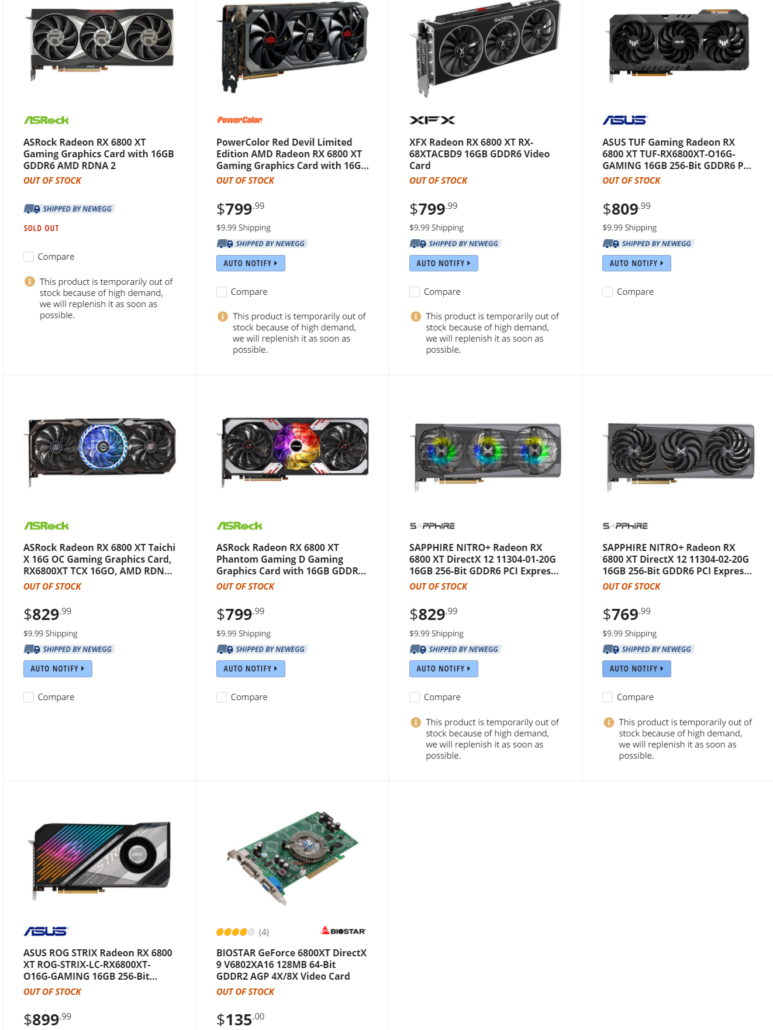
ASUS Radeon RX 6800 XT & RX 6800 Custom Graphics Cards
The ASUS Radeon RX 6800 series custom graphics cards range from air-cooled to liquid-cooled variants. ASUS is also the first to introduce a liquid-cooled variant for AMD’s RDNA 2 GPUs that power the Radeon RX 6800 XT & RX 6800 graphics cards. The most noteworthy model is the LC variant which features a closed-loop cooling solution and will be the first one that we will detail.
ASUS ROG STRIX LC Radeon RX 6800 XT Liquid Cooled Graphics Card
The ASUS ROG STRIX LC Radeon RX 6800 XT is a full-on liquid-cooled design that makes use of the ROG STRIX Radeon RX 6800 XT PCB but couples it with the power of liquid cooling. The liquid cooler features a 240mm radiator that has braided tubing leading to a custom pump model that has been designed specifically for the Navi 21 “RDNA 2” GPU. The shroud on the card itself is gorgeous with a stunning display of ASUS’s AURA SYNC RGB lighting and a futuristic shroud design. The shroud also comes with a blower-style fan that will blow air through the internal chassis of the graphics card.
As for the internal chassis, a large cold plate is said to cool both the GPU silicon and GDDR6 VRAM featured on the PCB. The graphics card is definitely going to be a standout design for the Radeon RX 6800 XT graphics card, offering a premium cooling design for a hefty premium. The card will be powered by a standard dual 8-pin connector configuration and will feature clocks up to 2360 MHz boost. Expect the card to cost around $899 US or higher at launch.
ASUS ROG STRIX Radeon RX 6800 Triple-Fan Cooled Graphics Card
As for the standard air-cooled ROG STRIX Radeon RX 6800 graphics card, ASUS has gone with a design that’s similar to the ROG STRIX GeForce RTX 30 series graphics cards. The card features 3 axial-tech-based fans with 13 fan blades & a massive heatsink underneath the shroud. This cooling design comes in a 2.9 slot form factor which is just a cooler way of saying 3-slot design.
The graphics card comes with a nice looking backplate which covers the entire length of the card and even extends beyond the PCB. A small cut out at the back helps push air out from the back. The front of the custom card has a dual-tone design with frames that seem to be made out of aluminum extending out & giving the card a more premium feel which looks similar to ASUS’s Poseidon series offerings. The heatsink underneath is made up of a large aluminum fin stack that makes use of at least 6 heat pipes.
ASUS is also be investing in some cool features such as an RGB strip that runs the entire side length of the card. Display options on the ROG STRIX Radeon RX 6800 will likely include a pair of HDMI and DP ports along with the USB Type-C VirtualLink connector. Both cards will feature a standard dual 8-pin power connector configuration.
ASUS Radeon RX 6800 XT & Radeon RX 6800 TUF Gaming Graphics Cards
Like the ROG STRIX lineup, the TUF Gaming series will feature Axial-tech-based fans but with 9 fan blades unlike the 13 blades on the ROG STRIX variants. They will also feature 0dB fan technology and house some quality electrical components to deliver stable power to the GPU and memory. It looks like the TUF Gaming lineup will also feature a 2.9 slot design.
The cards share the same display configuration as the ROG STRIX variants which are made up of triple DisplayPort 1.4a ports and dual HDMI 2.1 ports. There’s a nice-looking backplate that has a solid-aluminum GPU plate to hold the cooler to the graphics card. There’s also a cut-out for the third fan as the cooler extends beyond the PCB. Finally, you can see a small TUF Gaming logo that illuminates in bright orange colors on the side of the card.
Sapphire Radeon RX 6800 XT & RX 6800 Custom Graphics Cards
The Sapphire Radeon RX 6800 series graphics card line up is split into the Nitro+ and PULSE series. The Nitro+ being the more premium lineup comes in both RX 6800 XT & RX 6800 flavors and even includes one additional Special Edition ‘SE’ variant for the Radeon RX 6800 XT graphics card. So let us start with the Nitro+ series graphics lineup first.
Sapphire RX 6800 XT & RX 6800 Nitro+ Series Graphics Cards
The Radeon RX 6800 XT Nitro+ from Sapphire is shown to be a massive triple-fan cooled graphics card. Two of the fans feature 9 blades each while the one at the end features 12 fan blades and as such, we can expect them to push lots of airflow towards the central heatsink assembly.
The card features a massive metal backplate and it does extend beyond the length of the PCB. There’s a cutout at the backside to let air pass through the aluminum fins. You can also spot an RGB Nitro+ logo which looks great with the whole aesthetics of the card.
The card is said to feature a 2.7 slot design and from the looks of it, features a large aluminum heatsink beneath the shroud which features 6 massive heat pipes. Details such as final clocks & PCB design remain unknown at the moment but we expect them to be shared prior to the launch on the 18th of November.
Sapphire RX 6800 XT Nitro+ SE ‘Special Edition’ Graphics Card
The main difference between the Sapphire RX 6800 XT Nitro+ SE and the Nitro+ variants seems to be the fans that feature RGB LEDs integrated within them. The SE also seems to be the only variant in Sapphire’s RX 6800 lineup to feature a USB Type-C connector whereas the rest of the Nitro+ line is configured with three DP and a single HDMI port.
Aside from that, we can expect the SE variant to feature higher factory overclocks of up to 2360 MHz and a slightly better PCB. All Nitro+ Radeon RX 6800 series graphics card variants feature a dual 8-pin power connector configuration so a good PSU around 700-800W would be ideal for these cards. The Nitro+ variants are clocked at 2190 and 2360 MHz, respectively.
Sapphire RX 6800 XT & RX 6800 PULSE Series Graphics Cards
Finally, we have the PULSE variants which come in Radeon RX 6800 XT & RX 6800 series. Unlike the massive 12-fan blade cooling systems on the Nitro+, the PULSE series gets a triple-fan solution that is comprised of 9-fan blades. The heatsink underneath looks largely the same but we can see one less heatpipe for the PULSE variant.
The card also looks to be less wide and comes with the red and black trim that PULSE cards are known for. Once again, both cards feature a dual 8-pin connector configuration while display outputs include the standard 1 HDMI and triple DP ports. The card also features no RGB LEDs. The PULSE variants are clocked at 2310 and 2170 MHz, respectively.
PowerColor Radeon RX 6800 XT & RX 6800 Custom Graphics Cards
PowerColor will be offering its custom Radeon RX 6800 series graphics cards in the ultra-enthusiast Red Devil and the sleeker Red Dragon variants. The Red Devil is going to be a very limited variant with 1000 units in production for the RX 6800 XT.
PowerColor Radeon RX 6800 Red Devil Graphics Cards
The Radeon RX 6800 XT & RX 6800 Red Devil graphics cards are going to be PowerColor’s top of the line offerings and feature a triple-fan and triple-slot cooling design. Each fan on the card features a total of nine fan blades which direct air towards the internal heatsink assembly. The card itself features a brand new design aesthetic on the shroud which has large LED bars that lead towards the rear end, giving a more devilish look to this card.
Both the front shroud and backplate are made out of aluminum alloy metal to provide a premium aesthetic. Underneath the shroud is a massive aluminum heatsink array with seven thick copper heat pipes that run through the heatsink. There are exhaust vents on the backplate that push air out for optimal airflow on the Red Devil cards.
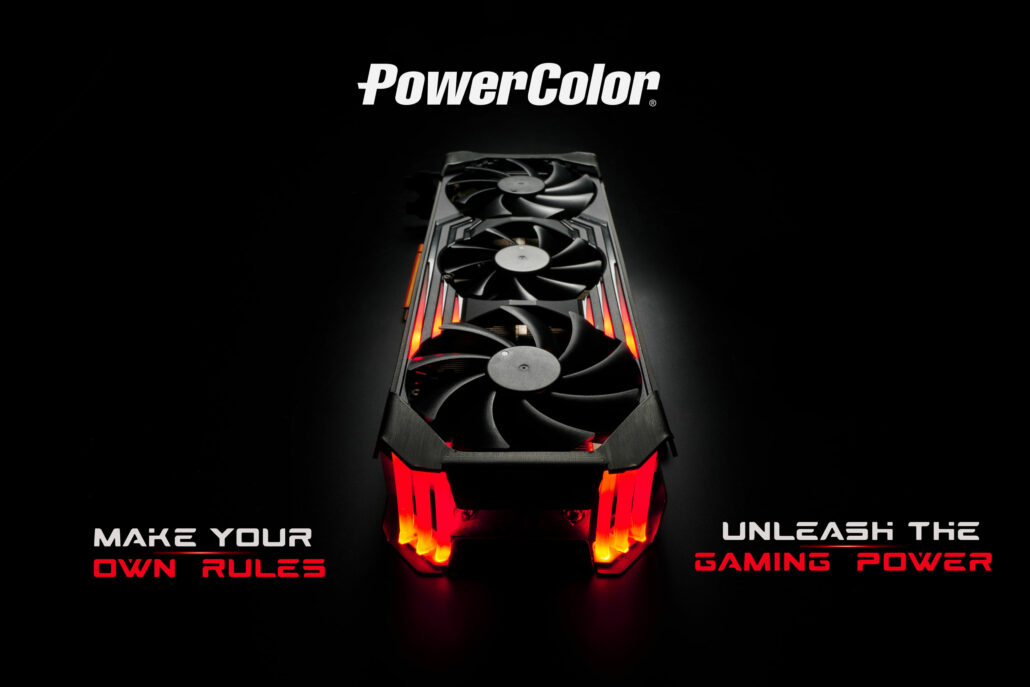
PowerColor hasn’t revealed the clocks yet for its Red Devil Radeon RX 6800 XT & RX 6800 series line but it is stated that both cards would utilize a 14+2 phase VRM with DrMOS, high polymer caps, and receive power through dual 8-pin connectors.
Display outputs on the PowerColor Radeon RX 6800 XT & RX 6800 Red Devil include two DP, 1 HDMI, and a single USB Type-C port. Based on what it stated, the Limited Edition variants of the Red Devil will feature Type-C ports while the standard variants won’t feature Type-C connectivity. The Radeon RX 6800 XT Red Devil (Limited Edition) features clock speeds of 2090 MHz Game and 2340 MHz Boost while the Radeon RX 6800 (Limited Edition) features clock speeds of 1980 MHz Game and 2190 MHz boost.
PowerColor Radeon RX 6800 Red Dragon Graphics Cards
PowerColor will also be offering the Radeon RX 6800 series in Red Dragon flavors. The PowerColor Red Dragon RX 6800 series is a more standard 2.5 slot design but still features a hefty heatsink and triple-fan cooling. The cooler and backplate extend beyond the PCB which seems to be using a slightly modified version of the reference design. Both cards will feature dual 8-pin connectors and come with a slightly higher premium over the reference models.
The Radeon RX 6800 XT Red Dragon comes clocked at 2065 MHz Game and 2310 MHz boost clocks while the Radeon RX 6800 Red Dragon comes with clock speeds rated at 1950 MHz Game and 2170 MHz boost.
MSI Radeon RX 6800 XT & RX 6800 Custom Graphics Cards
The MSI Radeon RX 6800 XT & RX 6800 Gaming X Trio graphics cards come in the standard ‘Non-X’ and factory overclocked ‘X’ series. The standard variants stick to the reference clock speeds that AMD has specified while the factory overclocked variants run with faster-overclocked speeds.
The Radeon RX 6800 XT Gaming X Trio for instance runs at 2285 MHz boost clocks which is a 35 MHz higher clock than the reference variant while the RX 6800 Gaming X Trio runs at a boost clock of 2155 MHz which is a 50 MHz clock bump over the reference boost clock.
MSI Radeon RX 6800 XT Gaming X Trio Graphics Card:
MSI Radeon RX 6800 Gaming X Trio Graphics Card:
The MSI Gaming X Trio Radeon RX 6800 Series Graphics Cards With 2nd Tri-Frozr Cooling
With the differences out of the way, now let’s talk about the similarities and the main highlights of the Gaming X Trio design. The Gaming X Trio is a toned-down variant of the much higher-end card, the MSI Lightning. Both cards use advanced Tri-Frozr coolers which are the replacement of the MSI Twin Frozr series which have been widely used in current and last generation graphics cards from MSI.
The latest iteration of MSI’s iconic GAMING series once again brings performance, low-noise efficiency, and aesthetics that hardcore gamers have come to recognize and trust. Now you too can enjoy all your favorite games with a powerful graphics card that stays cool and silent. Just the way you like it.
MSI has incorporated and refined a couple of things in the new Tri-Frozr design for Gaming X Trio graphics cards. First is the TORX fan 4.0 which uses a ring design that connects two fan-blades with each other to increase airflow towards the internal heatsink assembly. These fans are made up of a double ball bearing design which ensures silent functionality in heavy loads.
The fans are fully compliant with the Zero Frozr Technology and are actually comprised of three areas. All of these would stay at 0 RPM (idle state) if the temperatures don’t exceed 60C. When it does exceed 60C, all fans would start spinning. You can change that through the MSI configuration panel if you want more cooling performance over noise load but it’s a nifty feature that I do like.
In addition to the cooling fans, the heatsink has been designed to be denser by using the brand new wave curved 2.0 fin design. The new heatsink makes use of deflectors to allow more air to pass through the fins smoothly, without causing any turbulence that would result in unwanted noise. MSI estimates a 2 degrees (C) drop in temperatures with the updated design versus the previous generation cooling system.
Talking about the heatsink, the massive block is comprised of seven copper squared shaped heat pipes with a more concentrated design to transfer heat from the copper base to the heatsink more effectively. The base itself is a solid nickel-plated base plate, transferring heat to the heat pipes in a very effective manner. To top it all off, MSI uses their exclusive Thermal Compound X which is said to offer higher thermal interface and heat transfer compared to traditional TIM applications.
Gigabyte Radeon RX 6800 XT & RX 6800 Custom Graphics Cards
Gigabyte has launched the Radeon RX 6800 series graphics cards in both AORUS and Gaming variants. All models are supplemented with a factory overclock with the Gaming series running at 2285 and 2045 MHz respectively while the AORUS variant clock speeds are yet to be confirmed.
AORUS Radeon RX 6800 Master Series Graphics Cards:
Gigabyte Radeon RX 6800 Gaming OC Series Graphics Cards:
ASRock Radeon RX 6800 XT & RX 6800 Custom Graphics Cards
The ASRock Radeon RX 6800 series graphics cards come in two Radeon RX 6800 XT and two Radeon RX 6800 flavors. The top model is the ASRock Radeon RX 6800 XT Taichi which leaked out a couple of days ago too. You can find out the graphics cards in the links below while we have also detailed them for you:
ASRock RX 6800 XT Taichi Graphics Card
The ASRock Radeon RX 6800 XT Taichi is an evolution of the first Taichi model we got to see on the Radeon RX 5700 XT Taichi graphics card. The card retains its triple-fan cooling solution and comes with a 2.5 slot form factor design. At the front, we can spot three fans with 11 fan blades each. The fan in the middle is slightly smaller which is due to the spiral RGB design that engulfs it entirely. The fans have Taichi logos in the middle and the whole industrial look of the card is very nice.
On the back of the card, ASRock’s Radeon RX 6800 XT Taichi sports a full cover backplate with a dual-tone (brushed aluminum / matte black) color scheme. The card features the Taichi logo on the back which lits up with ASRock’s Polychrome RGB feature. On the back, we can also spot a few very interesting features such as the dual BIOS modes which include P BIOS (Performance) and Q BIOS (Quiet). The card also lets users disable the LEDs through a switch on the back. ASRock will be using 70A Dr.MOS MOSFETS and premium 90A Power Chokes on its Taichi series.
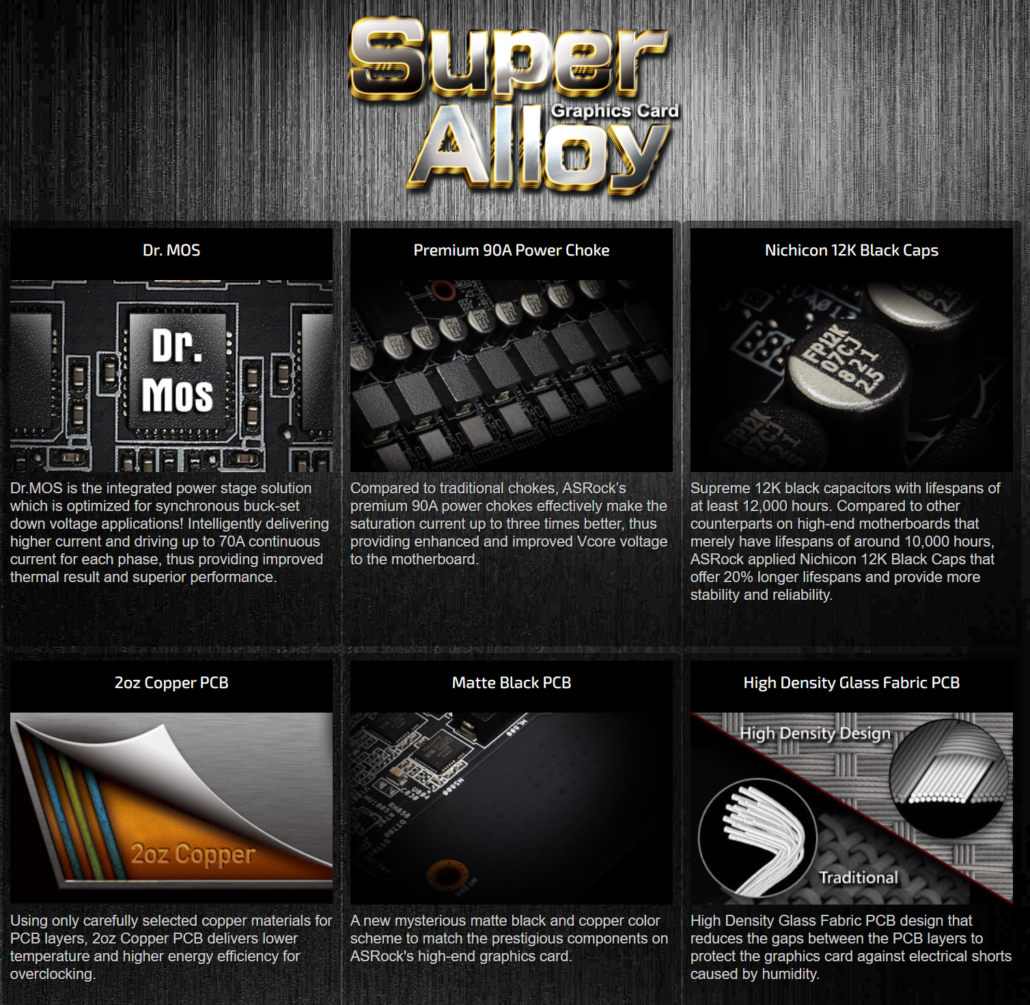
In terms of power, it looks like ASRock is going all out with a triple 8-pin connector configuration so we can expect the PCB and factory overclock to be mighty insane on this variant. Display outputs on the card include two DP, 1 HDMI, and a single USB Type-C port. The Taichi will run at a 2110 MHz Game and 2360 MHz boost clocks.
ASRock RX 6800 Phantom Gaming Graphics Cards
The ASRock Radeon RX 6800 Phantom Gaming graphics cards come with the back and silver livery that is known of the PG design along with red accents. The card has an abundance of Polychrome SYNC RGB effects around the middle fan and the sides of the shroud. The difference between both cards is the width. The RX 6800 XT makes use of a wider and longer PCB compared to the RX 6800 Phantom Gaming which sticks to a standard PCB design but features a wider cooler and backplate.
On the Radeon RX 6800 XT Phantom Gaming, you get a full coverage backplate with LED On/Off switches and a triple 8-pin connector configuration while for the Radeon RX 6800 PG, ASRock has included a backplate that only covers up till have the length of the third fan. This is to vent out the air from the back of the card.
You can also spot that ASRock is using a massive aluminum heatsink that features 6 heat pipes. Power is provided through a dual 8-pin connector configuration. Both cards feature a Stripe-Axial fan design with a total of 11 fan blades. There’s also a reinforced metal frame to add extra durability to the PCB. Both cards will feature 2310 and 2190 MHz boost clocks, respectively.
ASRock RX 6800 Challenger Pro Graphics Card
Finally, we have the ASRock Radeon RX 6800 Challenger Pro graphics card which is a fairly standard custom design that looks kind of similar to Gigabyte’s WindForce & Gaming series graphics cards. It comes with a triple-fan and 2.5 slot design, a similar heatsink as the RX 6800 PG, and slight use of RGB LEDs towards the side of the shroud. The card is powered by a dual 8-pin power connector config too.
ASRock has included a backplate that only covers up till have the length of the third fan. This is to vent out the air from the back of the card. The ASRock RX 6800 Challenged Pro will operate up to 2140 MHz boost clocks.
XFX Radeon RX 6800 XT & RX 6800 Custom Graphics Cards
XFX Radeon RX 6800 XT & RX 6800 ‘Speedster Mercury 319’ Custom Graphics Cards
XFX has also provided a better look at its own triple-fan custom design for the Radeon RX 6800 XT and Radeon RX 6800 graphics cards, known as the Speedster Merc 319. The graphics card takes a lot of inspiration from the THICC III variant we saw on the RX 5700 series cards and takes it up one notch by offering a sleeker design.
We can see that the card will feature a black color scheme and what seems to be either white or silver texturing around the fans and shroud. The front shroud features a triple-fan design which indicates that this is the THICC III variant we are looking at from XFX. The Radeon RX 6800 XT & RX 6800 THICC series cards will feature 13 fan blades each on two fans on the side and the one in middle seems slightly smaller due to the positioning of the Radeon logo and as such, it could end up featuring a lower fan-blade count due to the reduced diameter.
The back of the card features a very solid back-plate design that comes with cut-outs in XFX naming and a larger exhaust vent on the back which the rear fan can blow air out of. The cooling solution comprises a large aluminum heatsink block and incorporates seven 6mm heatpipes which will offer some good cooling results when the card is running at peak gaming loads.
As for clock speeds, the XFX RX 6800 XT MERC 319 is rated at a 2090 MHz Game & 2340 MHz boost clock while the RX 6800 MERC 319 is rated at a 1980 MHz Game and 2190 MHz boost clock.
Yeston Radeon RX 6800 XT & RX 6800 Custom Graphics Cards
Yeston also seems to be keeping their tradition alive by prepping up an anime-inspired graphics card known as the Sakura Hitomi series. This is in fact the same Sakura series that they launched with the Radeon RX 5700 XT but here we see a massively different design theme. From the looks alone, the Radeon RX 6800 XT Sakura is a fully custom design and one of the only Radeon cards to feature a white PCB.
The graphics card features a triple-fan cooling in a 2.5 slot design with the blades shaped like rose petals. There are 9 blades on each fan and the front shroud has solid bars extending throughout. The card features white, purple, and blue color accents which looks very neat and offers a nice departure from the flashy and colorful designs that we have seen on gaming-oriented custom designs.
The Radeon RX 6800 XT Sakura comes with a custom-painted backplate which has an anime-waifu laser etched over it. The PCB seems to offer no cutouts for the third fan as it only extends till the second fan, leaving the space beneath the third fan. It looks like the third fan will be blowing air out from the sides rather than the back which also works since the main goal of the third fan is to cool the heatsink fins underneath it. Clocks and pricing for this model are not known but it will be kept exclusive to the Asian Pacific market but could be shipped to the US & EU through online retailers.

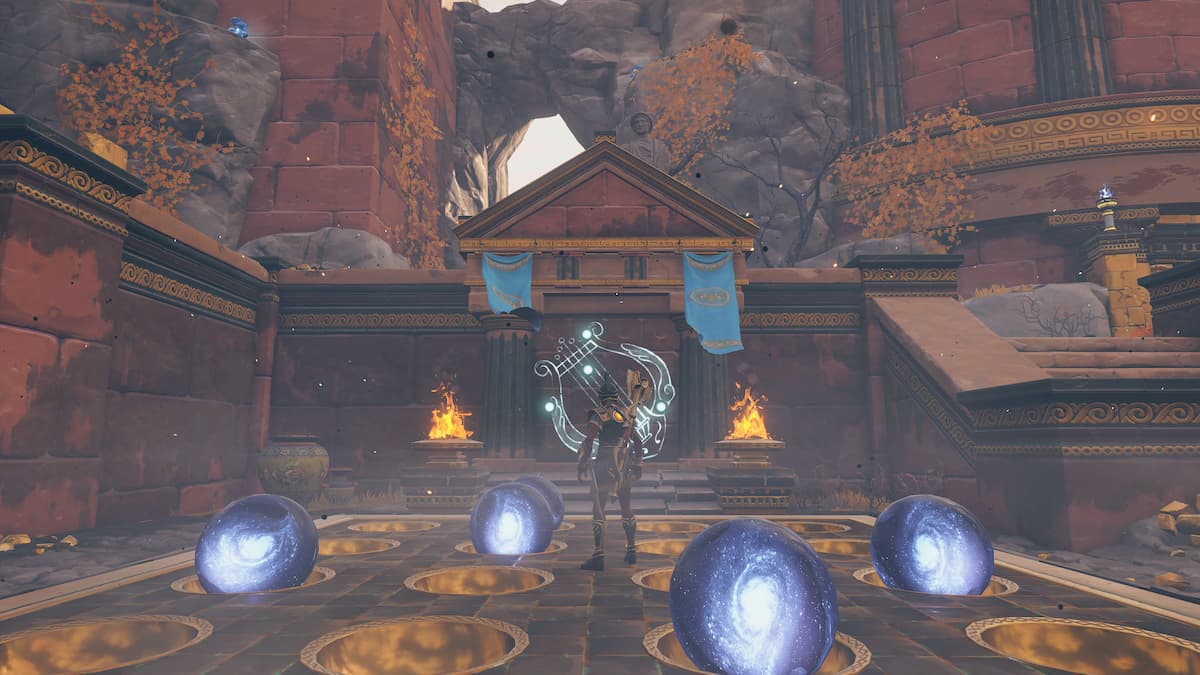
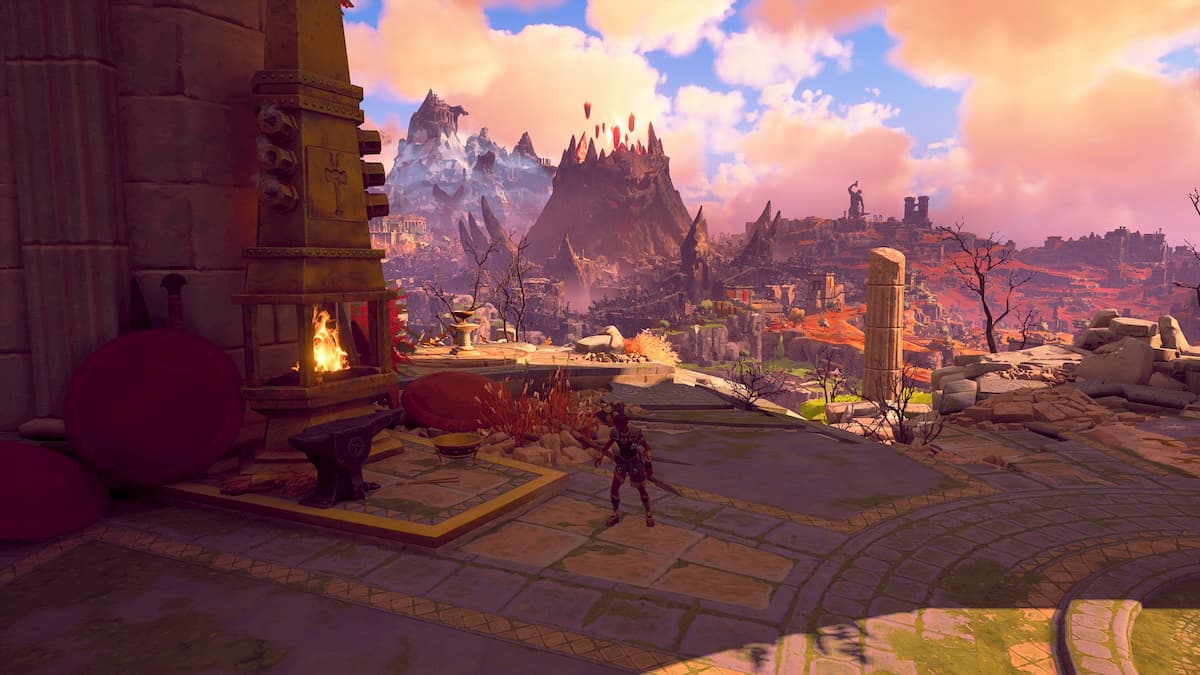

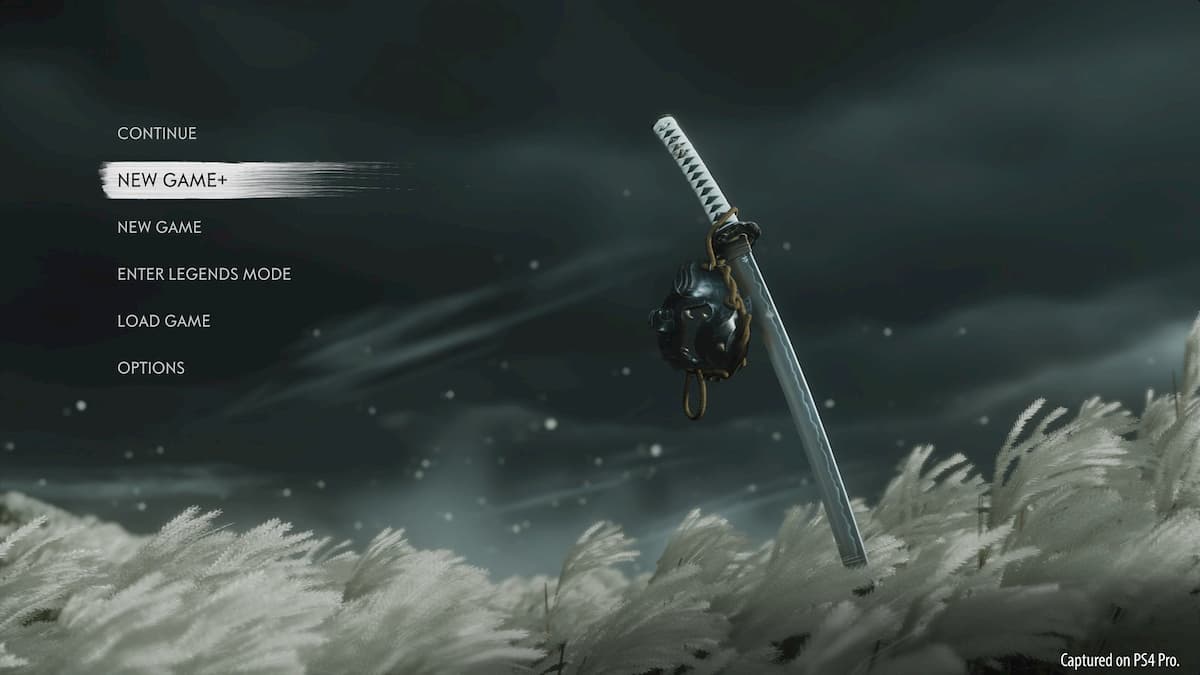


More Stories
AMD Radeon RX 6800 XT “Big Navi” GPU Alleged 3DMark Benchmarks Leaked – Faster Than GeForce RTX 3080 at 4K, Slower In Port Royal Ray Tracing
AMD Ryzen 7 5800H 8 Core & 16 Thread Cezanne ‘Zen 3’ High-Performance CPU Shows Up, Early ES Chip With 3.2 GHz Clocks
BitFenix Announces Two New Cases, The Nova Mesh SE and the Nova Mesh SE TG